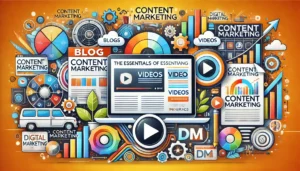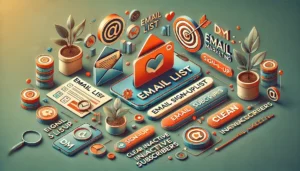DM Essentials: A Comprehensive Guide to Digital Marketing

Digital marketing (DM) is an essential part of modern business. It uses the internet to promote products and services, making it easier to reach a wide audience. This guide will help you understand the basics of digital marketing, how to create effective strategies, and the latest trends in the field.
Key Takeaways
- Digital marketing includes various online methods to reach customers.
- A strong strategy should focus on clear goals and knowing your audience.
- Content is key; valuable and engaging content attracts and retains customers.
- Social media is a powerful tool for connecting with your audience.
- Analytics help you track success and improve your marketing efforts.
Understanding the Basics of Digital Marketing (DM)
What is Digital Marketing?
Digital marketing is the practise of promoting products or services using digital channels. It encompasses a wide range of activities that help businesses connect with their audience online. From social media to email campaigns, digital marketing is essential in today’s world.
Key Components of Digital Marketing (DM)
To effectively engage with our audience, we must understand the key components of digital marketing:
- Search Engine Optimisation (SEO): Enhancing website visibility on search engines.
- Content Marketing: Creating valuable content to attract and retain customers.
- Social Media Marketing: Using platforms like Facebook and Instagram to engage with users.
- Email Marketing: Sending targeted messages to nurture leads and customers.
The Evolution of Digital Marketing
Digital marketing has evolved significantly over the years. Initially, it was about simple online ads. Now, it involves complex strategies that leverage data and technology. We can see how it has transformed:
- From Static Websites to Interactive Experiences: Websites are now dynamic and user-friendly.
- The Rise of Social Media: Platforms have become vital for brand engagement.
- Data-Driven Decisions: Analytics help us understand customer behaviour and preferences.
In the world of digital marketing, measuring success is crucial. This page from PPC Geeks provides insights on measuring marketing success and offers various free audits for platforms like Facebook, YouTube, and Instagram. It emphasises tailored PPC management and strategies for e-commerce, lead generation, and Google Ads. The agency positions itself as a leader in PPC management, aiming to enhance brand visibility and performance through specialised services.
Building a Strong Digital Marketing (DM) Strategy
In today’s fast-paced digital world, having a solid marketing strategy is essential. A well-structured plan can significantly enhance our chances of success. Here are some key elements to consider:
Setting Clear Objectives
- Define what we want to achieve. This could be increasing brand awareness, generating leads, or boosting sales.
- Make our objectives SMART: Specific, Measurable, Achievable, Relevant, and Time-bound.
- Regularly review and adjust our goals based on performance.
Identifying Your Target Audience
Understanding who our customers are is crucial. We should:
- Conduct market research to gather insights.
- Create customer personas to represent our ideal clients.
- Tailor our marketing messages to resonate with these audiences.
Choosing the Right DM Channels
Selecting the appropriate channels can make a big difference. We can consider:
- Social media platforms like Facebook, Instagram, and LinkedIn.
- Email marketing for direct communication.
- Content marketing to provide value and engage our audience.
By leveraging data to fuel growth, we can make informed decisions that enhance our marketing efforts.
In conclusion, a strong digital marketing strategy is built on clear objectives, a deep understanding of our audience, and the right channels. Let’s focus on these areas to drive our success in the digital landscape!
DM Essentials: Content Marketing – Creating Valuable Content
Types of Content Marketing
In our journey through content marketing, we discover various types that can engage our audience effectively. Here are some popular forms:
- Blog Posts: These are great for sharing insights and driving traffic.
- Videos: Engaging and informative, they capture attention quickly.
- Infographics: Visual representations of data that simplify complex information.
Content Creation Tips (DM Essentials)
Creating valuable content is essential. Here are some tips to keep in mind:
- Know Your Audience: Understand their needs and preferences.
- Be Authentic: Share genuine stories and insights.
- Focus on Quality: High-quality content builds trust and credibility.
Measuring Content Performance
To ensure our content is effective, we must measure its performance. Here are key metrics to track:
- Engagement Rates: Likes, shares, and comments indicate how well our content resonates.
- Traffic Sources: Understanding where our visitors come from helps refine our strategy.
- Conversion Rates: Ultimately, we want to see how many visitors take action after consuming our content.
In the world of digital marketing, content is king. It not only attracts but also retains customers, making it a vital part of our strategy.
By focusing on these aspects, we can create content that not only informs but also engages our audience, driving them to take action. Remember, the goal is to provide value and build lasting relationships with our customers.
In conclusion, as we explore the realm of content marketing, we must always keep our audience at the forefront of our efforts. This approach will lead to more effective campaigns and a stronger connection with our target market.
DM Essentials: Social Media Marketing – Engaging Your Audience
Popular Social Media Platforms
In today’s digital world, social media platforms are essential for connecting with our audience. Here are some of the most popular ones:
- Facebook: Great for community building and advertising.
- Instagram: Perfect for visual storytelling and brand engagement.
- Twitter: Ideal for real-time updates and customer interaction.
Creating a Social Media Strategy (DM Essentials)
To effectively engage our audience, we need a solid strategy. Here are key steps to consider:
- Define our goals: What do we want to achieve?
- Know our audience: Who are we trying to reach?
- Choose the right platforms: Where does our audience spend their time?
- Create engaging content: What will capture their attention?
- Monitor and adjust: How will we measure success and adapt?
Measuring Social Media Success
To understand our impact, we must track specific metrics. Here are some key ones:
- Engagement Rate: Likes, shares, and comments.
- Reach: How many people see our posts.
- Conversion Rate: How many take action after seeing our content.
Engaging our audience on social media is not just about posting content; it’s about building relationships and creating a community around our brand. This connection can lead to increased loyalty and sales.
DM Essentials: Search Engine Optimisation (SEO) – Boosting Your Online Visibility
On-Page SEO Techniques
To enhance our website’s visibility, we must focus on on-page SEO. This involves optimising individual pages to rank higher and earn more relevant traffic. Here are some key techniques:
- Keyword Research: Identifying the right keywords is crucial. We should use tools to find terms our audience is searching for.
- Meta Tags: Crafting compelling title tags and meta descriptions can significantly improve click-through rates.
- Content Quality: High-quality, relevant content keeps visitors engaged and encourages them to share.
Off-Page SEO Strategies (DM Essentials)
While on-page SEO is important, we cannot overlook off-page SEO. This refers to actions taken outside our website to impact our rankings. Here are some effective strategies:
- Backlink Building: Gaining links from reputable sites boosts our credibility.
- Social Media Engagement: Sharing our content on social platforms can drive traffic and improve visibility.
- Guest Blogging: Writing articles for other blogs can help us reach new audiences and earn backlinks.
SEO Tools and Resources
Utilising the right tools can make a significant difference in our SEO efforts. Here’s a quick overview of some essential tools:
| Tool Name | Purpose |
|---|---|
| Google Analytics | Track website traffic and user behaviour |
| SEMrush | Keyword research and competitor analysis |
| Moz | SEO insights and link building |
In summary, a well-rounded SEO strategy combines both on-page and off-page techniques, supported by the right tools. By focusing on these areas, we can effectively boost our online visibility and attract more visitors to our site.
By implementing these strategies, we can ensure that our digital presence is strong and effective. Promoting branded content through SEO is essential for driving traffic and increasing engagement.
DM Essentials: Pay-Per-Click (PPC) Advertising – Driving Traffic
Understanding PPC Basics
PPC advertising is a method where we pay for each click on our ads. This approach allows us to drive targeted traffic to our websites. By using platforms like Google Ads, we can reach potential customers effectively. It’s essential to understand how to set up and manage these campaigns to maximise our return on investment.
Creating Effective PPC Campaigns (DM Essentials)
To create successful PPC campaigns, we should consider the following steps:
- Keyword Research: Identify relevant keywords that our target audience is searching for.
- Ad Creation: Write compelling ad copy that encourages clicks.
- Landing Page Optimisation: Ensure that the landing page is relevant and user-friendly.
Using a PPC management service can help streamline this process and improve our results.
Measuring PPC Performance
Measuring the success of our PPC campaigns is crucial. We can track various metrics, including:
- Click-Through Rate (CTR)
- Conversion Rate
- Cost Per Acquisition (CPA)
By analysing these metrics, we can adjust our strategies to enhance performance. A Google ads audit can provide insights into what’s working and what needs improvement.
In the world of digital marketing, understanding PPC is vital for driving traffic and generating leads. By focusing on effective strategies, we can significantly improve our online presence and marketing efficiency.
In conclusion, PPC advertising is a powerful tool for driving traffic. By understanding the basics, creating effective campaigns, and measuring our performance, we can achieve our marketing goals. Whether we are a PPC ecommerce agency or a small business, leveraging PPC can lead to substantial growth in our online visibility.
DM Essentials: Email Marketing – Connecting with Your Audience
Building an Email List
Creating a strong email list is essential for effective email marketing. We should focus on:
- Offering valuable content in exchange for email sign-ups.
- Using social media to promote our email list.
- Regularly cleaning our list to remove inactive subscribers.
Creating Engaging Email Content (DM Essentials)
Once we have our list, crafting engaging content is key. Here are some tips:
- Use catchy subject lines to grab attention.
- Personalise emails to make recipients feel valued.
- Include clear calls to action to guide readers.
Email Marketing Best Practises
To ensure our email marketing is effective, we must follow best practises:
- Segment our audience for targeted messaging.
- Test different formats and content types.
- Monitor performance metrics to refine our strategy.
In the world of digital marketing, email remains one of the most effective channels for connecting with our audience. By focusing on building relationships, we can enhance engagement and drive conversions.
In summary, email marketing is a powerful tool. By building a solid list, creating engaging content, and following best practises, we can connect with our audience effectively. Remember, accurate conversion tracking is crucial for optimising our campaigns and ensuring we reach the right customers.
DM Essentials: Analytics and Data – Measuring Your Success
Key Metrics to Track
To truly understand our digital marketing efforts, we must focus on specific metrics. Here are some key metrics we should track:
- Website Traffic: The number of visitors to our site.
- Conversion Rate: The percentage of visitors who complete a desired action.
- Bounce Rate: The percentage of visitors who leave after viewing only one page.
Using Google Analytics (DM Essentials)
Google Analytics is a powerful tool that helps us gather data about our website. It allows us to:
- Track user behaviour on our site.
- Understand where our traffic is coming from.
- Measure the effectiveness of our marketing campaigns.
Interpreting Data for Better Decisions
Data alone doesn’t tell the whole story. We need to interpret it wisely. Here are some tips:
- Look for trends over time rather than focusing on one-off spikes.
- Compare data across different channels to see what works best.
- Use insights to adjust our strategies and improve performance.
Understanding our data is crucial. It helps us make informed decisions that can lead to better outcomes.
In conclusion, by focusing on the right metrics and using tools like Google Analytics, we can measure our success effectively. This will guide us in refining our strategies and achieving our marketing goals. Data-driven decisions are key to our success!
Future Trends in Digital Marketing
The Role of AI in Digital Marketing
As we look ahead, artificial intelligence (AI) is set to transform how we approach digital marketing. AI can analyse vast amounts of data quickly, helping us understand customer behaviour better. This means we can tailor our strategies to meet their needs more effectively.
Voice Search Optimisation (DM Essentials)
Voice search is becoming increasingly popular. With the rise of smart speakers, we must adapt our content for voice queries. This involves using natural language and focusing on long-tail keywords. Here are some key points to consider:
- Use conversational phrases.
- Focus on local SEO.
- Optimise for featured snippets.
The Rise of Video Marketing
Video content is dominating the digital landscape. It’s engaging and can convey messages quickly. We should consider:
- Creating short, impactful videos.
- Using live streaming for real-time engagement.
- Incorporating user-generated content to build community.
Embracing these trends will not only keep us relevant but also enhance our connection with our audience.
In summary, as we navigate the future of digital marketing, we must remain adaptable. By leveraging AI, optimising for voice search, and embracing video, we can ensure our strategies are effective and engaging. Staying ahead of these trends is crucial for success.
Customer Experience: Enhancing Engagement
Understanding Customer Journey
In today’s digital landscape, understanding the customer journey is crucial. We must map out the steps our customers take, from awareness to purchase. This helps us identify pain points and opportunities for improvement. By enhancing the customer journey, we can significantly boost engagement.
Personalisation Strategies
Personalisation is key to making our customers feel valued. Here are some effective strategies:
- Use customer data to tailor recommendations.
- Send personalised emails based on past purchases.
- Create targeted ads that resonate with specific audiences.
Improving Customer Retention
Retaining customers is often more cost-effective than acquiring new ones. To improve retention, we can:
- Offer loyalty programmes that reward repeat purchases.
- Regularly seek feedback to understand customer needs.
- Provide exceptional customer service that resolves issues promptly.
Focusing on customer experience not only enhances engagement but also builds long-term loyalty.
In conclusion, by understanding the customer journey, personalising interactions, and improving retention strategies, we can create a more engaging experience for our audience. This is essential for our success in the digital marketing landscape, especially in light of the removal of keyword data and its implications for our strategies.
DM Essentials: Influencer Marketing – Leveraging Online Influencers
Identifying the Right Influencers
In the world of digital marketing, finding the right influencers is crucial. We need to consider several factors:
- Relevance: The influencer should align with our brand values.
- Engagement: Look for influencers with an active and engaged audience.
- Reach: Their follower count should match our target market size.
Creating Influencer Campaigns (DM Essentials)
Once we have identified suitable influencers, we can create effective campaigns. Here are some steps to follow:
- Set Clear Goals: What do we want to achieve? Increased brand awareness or sales?
- Develop Creative Content: Collaborate with influencers to create authentic content that resonates with their audience.
- Monitor and Adjust: Keep track of the campaign’s performance and make necessary adjustments.
Measuring Influencer Impact
To understand the effectiveness of our influencer marketing, we should measure key metrics:
- Engagement Rate: Likes, comments, and shares on posts.
- Traffic: Use tracking links to see how many visitors come from influencer posts.
- Conversions: Track sales or sign-ups generated through influencer campaigns.
Influencer marketing can be a game-changer for our brand. By leveraging the trust and reach of influencers, we can connect with our audience in a more personal way. This approach not only boosts visibility but also enhances credibility.
In conclusion, influencer marketing is a powerful tool. By carefully selecting influencers, crafting engaging campaigns, and measuring our success, we can effectively leverage this strategy to achieve our marketing goals. Engagement is key to making this work!
Influencer marketing is a powerful way to connect with your audience. By collaborating with popular online figures, brands can reach more people and build trust. If you’re interested in boosting your marketing strategy, visit our website for a free PPC audit and see how we can help you succeed!
Conclusion
In conclusion, digital marketing is a vital part of modern business. It helps companies connect with their customers in new and exciting ways. By understanding the different tools and strategies available, businesses can create effective campaigns that reach the right audience. Remember, the key to success in digital marketing lies in being adaptable and staying updated with the latest trends. Whether you are just starting or looking to improve your existing strategies, this guide serves as a helpful resource. Embrace the digital world, and watch your business grow!
Frequently Asked Questions
What is digital marketing?
Digital marketing is the way businesses promote their products or services using the internet and online tools. It includes methods like social media, email, and websites.
What are the key parts of digital marketing?
The main parts of digital marketing include content marketing, social media marketing, email marketing, and search engine optimisation (SEO). Each part helps reach customers in different ways.
How has digital marketing changed over time?
Digital marketing has evolved with technology. In the past, it was mainly about websites and emails. Now, it includes social media, mobile apps, and even artificial intelligence.
Why is having a digital marketing strategy important?
A digital marketing strategy helps businesses set goals, understand their audience, and choose the best ways to reach them. It makes marketing efforts more focused and effective.
What types of content are used in content marketing?
Content marketing can include blog posts, videos, infographics, and podcasts. The goal is to create helpful and engaging content that attracts and retains customers.
How do businesses measure success in social media marketing?
Businesses measure social media success by looking at likes, shares, comments, and follower growth. They also check how many people visit their website from social media.
What is SEO and why is it important?
SEO stands for search engine optimisation. It helps websites rank higher in search results, making it easier for people to find them. Good SEO can lead to more visitors and sales.
What are the future trends in digital marketing?
Future trends in digital marketing include the use of artificial intelligence, more focus on video content, and optimising for voice search. These trends will shape how businesses connect with customers.
Author
Search Blog
Free PPC Audit
Subscribe to our Newsletter
The Voices of Our Success: Your Words, Our Pride
Don't just take our word for it. With over 100+ five-star reviews, we let our work-and our satisfied clients-speak for us.
"We have been working with PPC Geeks for around 6 months and have found Mark and the team to be very impressive. Having worked with a few companies in this and similar sectors, I rate PPC Geeks as the strongest I have come across. They have taken time to understand our business, our market and competitors and supported us to devise a strategy to generate business. I value the expertise Mark and his team provide and trust them to make the best recommendations for the long-term."
~ Just Go, Alasdair Anderson




